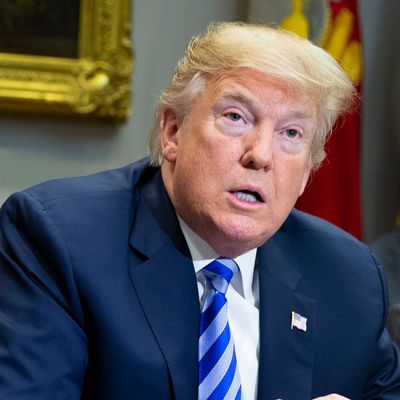
Thursday morning, President Trump declared steel and aluminum tariffs on the European Union, Canada, and Mexico. He also announced a pardon of Dinesh D’Souza, a right-wing provocateur and conspiracy theorist, whose cause had been taken up by Senator Ted Cruz, and floated granting two other pardons he might enjoy. What both these maneuvers have in common is Trump’s discovery of powers available to him under the Constitution that enable him to make change without any approval from other branches of government. It is a bit like a small child discovering dangerous weapons lying about the house.
Tariffs are a taxing power. Raising taxes usually requires two chambers of Congress. Why can Trump do it? A 1962 law gives the president authority to impose tariffs for national security reasons. In the middle of the 20th century, control of natural resources and certain kinds of manufacturing determined the outcome of wars. Japan and Nazi Germany selected areas of conquest in order to acquire oil and other resources needed to fuel their militaries; factories that built cars and appliances could be converted to making tanks and fighter planes. The law allowing the president to set tariffs for national security reasons set few limits on how this alleged need would be defined, but that didn’t matter, because presidents used it sparingly.
Great-power competition to turn control resources and factories into military domination barely exists any more. But the law still does, and Trump has exploited this ambiguity to full effect. It would be too kind to say his tariff policy has zero relationship to military necessity; in reality it has a negative relationship. Trump has imposed tariffs on America’s allies, not its enemies. Indeed, Canada, one of the tariff targets, is part of the Department of Defense’s industrial base.
Meanwhile, Trump has unilaterally relaxed trade sanctions on ZTE, a Chinese telecommunications firm that poses a wide array of serious national security risks. Why is Trump bailing out a dangerous Chinese firm that has violated American law? Well, he made his strange decision shortly after China announced a $500 million investment in a theme park right next to a Trump-owned property in Indonesia, which will put money directly in Trump’s pocket.
At best, the tariff power is being used capriciously, in a way that has lost all touch with its original intent. At worst, in combination with the president’s decision to maintain his worldwide business empire while in office, it is a recipe for using government policy to facilitate personal bribes.
The far more threatening and potentially expansive power is the use of the pardon. Trump has already experimented with using his ability to disappear any federal crimes, pardoning the racist human-rights abuser and Trump ally Joe Arpaio. His latest list of beneficiaries also have claims unrelated to the merits of their sentence. Martha Stewart and Rod Blagojevich both appeared on Apprentice spinoffs, and both were charged by prosecutors that Trump regards as personal enemies and is seeking to discredit.
Blagojevich, a flamboyantly corrupt former governor who once served as the Republican Party’s poster boy for the evils of the Democratic Party machine, wrote a Wall Street Journal op-ed this week likening himself to Trump, and tacitly promising to lend bipartisan credibility to the president’s crusade against the “Deep State” if pardoned. “The rule of law is under assault in America,” wrote Blagojevich. “It is being perverted and abused by the people sworn to enforce and uphold it. Some in the Justice Department and Federal Bureau of Investigation are abusing their power to criminalize the routine practices of politics and government.”
Why do presidents have the power to pardon federal offenses? It is a historical relic from centuries of practice under English monarchies. The law used to be utterly rigid, and frequently prescribed death as the only punishment which required the intervention of a monarch, to avoid especially brutal instances of unfair punishment. The founders of the Constitution transferred this executive power to the president with “little discussion.”
There is still an important role for remedying unfair sentences, and the presidency has developed an elaborate system for reviewing such cases. Trump has ignored it, preferring instead to hand out justice at his own whim. He is signaling that the law is whatever Trump says it is. His allies are receiving the message clearly. “It has to be a signal to Mike Flynn and Paul Manafort and even Robert S. Mueller III: Indict people for crimes that don’t pertain to Russian collusion and this is what could happen,” Roger Stone tells the Washington Post. “The special counsel has awesome powers, as you know, but the president has even more awesome powers.”
The potential for abuse inherent in the pardon power has never been fully exploited before. Imagine a president willing and able to suborn criminality on his behalf. Trump may have only begun to discover how awesome these powers are.






























